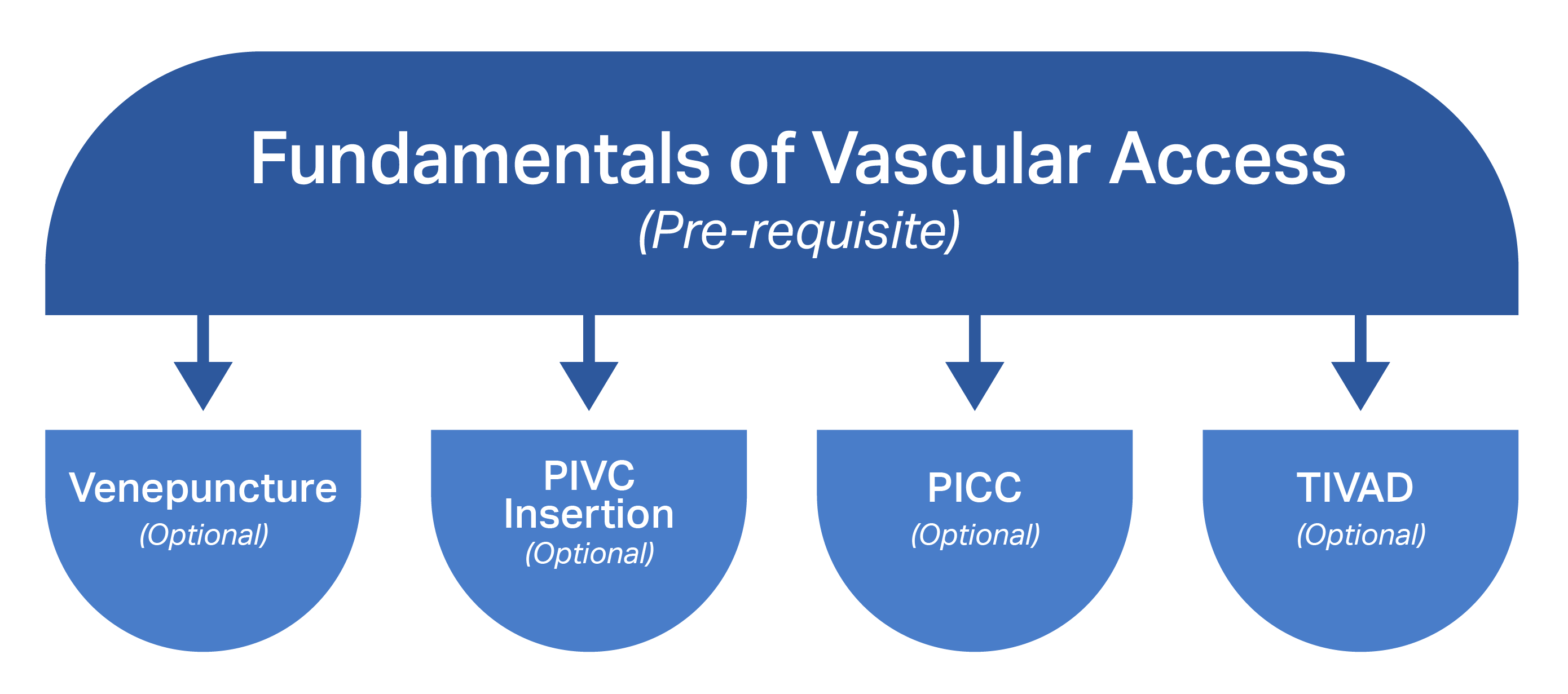
Welcome
The Central Adelaide Local Health Network (CALHN) Vascular Access Program is a selection of courses aiming to provide the fundamental skills and knowledge of vascular access topics. These currently include; Venepuncture, Peripheral Intravenous Catheter Insertion & Totally Implanted Vascular Access Device.
All staff are required to have the appropriate level of training prior to undertaking Vascular Access procedures e.g. managing a PICC line, inserting a PIVC, accessing a TIVAD, or Ultrasound guided cannulation 1234. Vascular access is a time of increased risk of complications, infection and injury to patients. Data from Australia and overseas indicate that a significant proportion of patients do not receive best practice care for their vascular access devices at time of insertion and ongoing management 5.
Aim: The intention of this course is to improve the knowledge and practice gap between guideline recommendations and current practice, in order to reduce the rates of complications and patient harm.
Intended Audience: CALHN Nursing Staff requiring accreditation in one or more of the Vascular Access Specialty Courses.
Key Documents:
* Network access required to view
References:
- Venepuncture for Blood & Blood Culture Specimen Collection*
- Peripheral Intravenous Catheter (PIVC): Insertion, Care, Management and Removal*
- Peripherally Inserted Central Catheter (PICC) – Care and Maintenance*
- Implantable Ports: Central Venous*
- Management of Peripheral Intravenous Catheters Clinical Care Standard (2021)
How this Program Works

Step One: Complete the Fundamentals of Vascular Access course, accessible via this link.
Please note - It will take about an hour for the system to recognise your completion before you are able to continue to the next step.
Step Two: Once this pre-requisite is marked Complete you will then be able to enrol into the specialty courses from this program page below. This page will become accessible via the Training Programs box to the left of the My Learning Overview heading on your dashboard.
Complete at least one of the speciality courses. The course completion criteria for these can be found at the start of each package. They may have different steps from each other.
Please note - This CALHN Vascular Access Program will only indicate completion once Fundamentals of Vascular Access and at least one of the specialty courses are marked Complete.
Support and Contact Details
If you have any questions or concerns regarding the content of this course, please contact Central Nurse Education.
Email: Health.CALHNnursingeducation@sa.gov.au
Phone: 08 7074 3500
For technical enquires regarding course access, or completion status, please email the Learning Central Team via support@centraladelaidelhn.zendesk.com.

The ECPS Project has a comprehensive learning pathway to help staff learn the new skills and workflows needed to embrace new ways of working.
This pathway includes opportunities to participate in training, embed new knowledge through practice and appropriate support after implementation.
The Central Adelaide Health Network (CALHN) Complex Behaviour Program is a selection of courses designed to develop the skills, knowledge and understanding for supporting a person experiencing complex behaviour.
Courses provided are the SA
Health Introduction to Preventing and Responding to Challenging Behaviour,
an online only module, Preventing and Responding to Complex Behaviour
(PRCB), Safety Interventions (SI) Foundation, single
day courses and Behaviour Support Training (BST), a 2 day course.
Your training recommendations may be based on where you work. More information is provided within the Program.
Aim: to provide clinicians with the skills and knowledge to support a person experiencing complex behaviour.
Intended audience: CALHN Clinical staff
Key documents:
- Our Commitment to Quality - CALHN*
- National Safety and Quality Health Service Standards
- SA Health Challenging Behaviours Strategic Framework
How this Program works
Step one:
All staff are required to complete the SA Health Introduction to Preventing and Responding to Challenging Behaviour module on employment and Minimising Restrictive Practices module, both are required as pre-requisite learning prior to booking any of the specialty courses.
Staff are encouraged to revisit these modules as a refresher prior to attendance.
Step two:
Once the pre-requisite modules are marked as completed, you will be able to enrol into the specialty course on the page below.
Recommended training pathways have been developed to assist you in choosing the appropriate course/s based on your learning objectives and the level of occurrence in your role. Click to reveal training pathways.
Specialty Courses
*Please note - This CALHN Complex Behaviours Program will indicate completion once at least one of the specialty courses are marked Complete.
Preventing and Responding to Complex Behaviours (PRCB)
Focus: – prevention, recognition, intervention (de-escalation and support escalation) and recovery
Duration: 8 hours
Safety Interventions (SI) Foundation
Focus: – recognition, de-escalation and disengagement
Duration: 8.5 hours
Behaviour Support Training (BST) - Blended PRCB and SI Program (2 Days)
Training available from mid 2025
Focus: – prevention, recognition, intervention (de-escalation and support escalation), disengagement and recovery
Duration: 15 hours (2 day course)
Complex Behaviour Program annual refreshers
*available on completion of initial full day course
PRCB – online module – 30 min equivalent (from early 2025)
Safety Intervention / BST – workshop 1.5hrs (book through Safety Interventions course)
Links to External Resources
Though there are commonalities in the way anxiety and behaviours of concern are expressed, and the way we should respond is essentially the same, there are some circumstances there may be need for variation. Consider the person living with dementia, who may have difficulty recalling what has occurred and may not be able to participate in future response planning.
Please explore External Resources Section (hyperlink directs to Challenging Behaviour Course) to learn more about how to support the person with specific presentations.Support and Contact Details
If you have any questions or concerns regarding the content of this course, please contact Central Nurse Education.
Email: Health.CALHNnursingeducation@sa.gov.au
Phone: 08 7074 3500
For technical enquires regarding course access, or completion status, please email the Learning Central Team via support@centraladelaidelhn.zendesk.com.